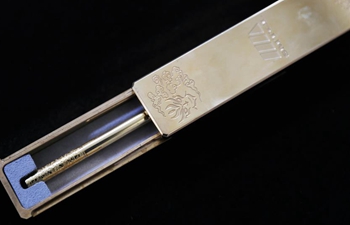WASHINGTON, Nov. 2 (Xinhua) -- The U.S. space agency NASA declared on Thursday that its spacecraft Dawn has run out of fuel and gone silent, marking the end of its historic mission to study the two most massive bodies in the asteroid belt.
Dawn missed scheduled communications sessions with NASA's Deep Space Network on Wednesday and Thursday, according to a press release.
After the flight team eliminated other possible causes for the missed communications, mission managers concluded that the spacecraft finally ran out of hydrazine, the fuel that enables the spacecraft to control its pointing, it said.
Dawn can no longer keep its antennae trained on Earth to communicate with mission control or turn its solar panels to the Sun to recharge, it added.
"The fact that my car's license plate frame proclaims, 'My other vehicle is in the main asteroid belt,' shows how much pride I take in Dawn," said Mission Director and Chief Engineer Marc Rayman at NASA's Jet Propulsion Laboratory.
"The demands we put on Dawn were tremendous, but it met the challenge every time. It's hard to say goodbye to this amazing spaceship, but it's time," he said in the press release.
The Dawn spacecraft was launched in 2007 with the mission to study Vesta and Ceres, the two largest objects in the asteroid belt located between Mars and Jupiter.
Propelled by an efficient ion engine, Dawn delved into the unknown and achieved what's never been attempted before: it is the first mission to orbit an object in the main asteroid belt, the first to visit a dwarf planet, and the first to orbit two deep-space destinations, according to NASA.
"The astounding images and data that Dawn collected from Vesta and Ceres are critical to understanding the history and evolution of our solar system," said Thomas Zurbuchen, associate administrator of NASA's Science Mission Directorate in Washington.
While the spacecraft is dead, scientists will continue studying the precious data it beamed back to Earth.
This is the second time that NASA bade farewell to a spacecraft this week. The space agency retired its Kepler Space Telescope on Tuesday.

















